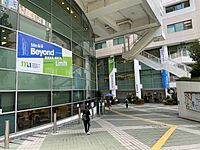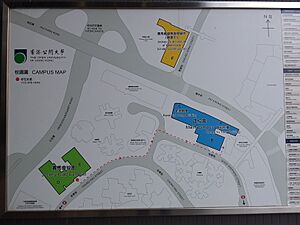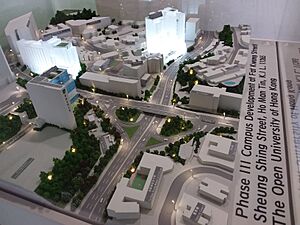Hong Kong Metropolitan University facts for kids
|
香港都會大學
|
|||||||||||||
 |
|||||||||||||
|
Former names
|
Open Learning Institute of Hong Kong (1989–1997) The Open University of Hong Kong (1997–2021) |
||||||||||||
|---|---|---|---|---|---|---|---|---|---|---|---|---|---|
| Motto | 勵學致遠 敬慎日新 (Chinese) Transcendence through Erudition and Renewal (English) |
||||||||||||
| Type | Public, self-financing | ||||||||||||
| Established | 1989 (as Open Learning Institute of Hong Kong) 1997 (with full university status) |
||||||||||||
| Chancellor | John Lee Ka-chiu | ||||||||||||
| President | Paul Lam Kwan-sing | ||||||||||||
| Vice-president | Prof. Reggie Kwan Ching-ping (Provost) Prof. Lui Yu-hon (Resources & Development) Prof. Ricky Kwok Yu-kwong (Students & Support) |
||||||||||||
| Students | 20,024 (2024) | ||||||||||||
| Location | |||||||||||||
| Campus | Urban | ||||||||||||
| Colors | |||||||||||||
| Affiliations | International Council for Open and Distance Education (ICDE) JUPAS Guangdong–Hong Kong–Macao University Alliance (GHMUA) Jiangsu-Hong Kong-Macau Universities Alliance (JHMUA) Federation for Self-financing Tertiary Education Alliance of Universities of Applied Sciences |
||||||||||||
| Chinese name | |||||||||||||
| Traditional Chinese | 香港都會大學 | ||||||||||||
| Simplified Chinese | 香港都会大学 | ||||||||||||
| Cantonese Yale | Hēunggóng Dōuwúi Daaihhohk | ||||||||||||
|
|||||||||||||
| Alternative Chinese name | |||||||||||||
| Traditional Chinese | 香港公開大學 | ||||||||||||
| Simplified Chinese | 香港公开大学 | ||||||||||||
| Cantonese Yale | Hēunggóng Gūnghōi Daaihhohk | ||||||||||||
|
|||||||||||||
| Open Learning Institute of Hong Kong | |||||||||||||
| Traditional Chinese | 香港公開進修學院 | ||||||||||||
| Simplified Chinese | 香港公开进修学院 | ||||||||||||
| Cantonese Yale | Hēung góng gūng hōi jeun sāu hohk yún | ||||||||||||
|
|||||||||||||
Hong Kong Metropolitan University (HKMU) is a public university in Ho Man Tin, Kowloon, Hong Kong. It was once known as the Open University of Hong Kong. This university is special because it is the only self-financing university started by the Hong Kong government.
The university first opened in 1989 as the Open Learning Institute of Hong Kong. It became a full university in 1997, focusing on distance learning. This means students could study from home. In 2001, it started offering regular full-time courses. In 2021, its name changed to Hong Kong Metropolitan University.
HKMU has five main schools and over 13,700 students in its full-time programs. The current president is Professor Lam Kwan Sing.
Contents
History of HKMU
How the University Started
The Hong Kong government created the Open Learning Institute of Hong Kong (OLI) in May 1989. It was the first place in the city to offer distance learning. This was to help adults who were working get an education or learn new skills. Unlike other universities at the time, OLI did not have strict entry tests.
OLI had to get ready very quickly for its first 4,200 students. The government helped with money at first, but OLI had to become self-funded by 1993. The Open University in the United Kingdom helped OLI set up its courses and management.
More than 63,000 people applied to OLI in its first year. The first students graduated in December 1993. In 1997, OLI officially became the Open University of Hong Kong. It was the seventh university in Hong Kong.
Growing and Improving
In 1999, the Open University of Hong Kong (OUHK) won an award for being an excellent institution for distance education. The Hong Kong government also gave it money to become a top center for adult learning. In 2000, the university's online library won a global award for its technology.
The Li Ka Shing Foundation donated HK$40 million in 2000. Because of this, a learning center was named the Li Ka Shing Institute of Professional and Continuing Education.
Starting Full-Time Courses
In September 2001, OUHK began offering full-time associate degree programs. These were like the first two years of a university degree. By 2005, it also offered full-time top-up degree programs. These programs help students finish their bachelor's degree.
OUHK also started working with hospitals to train nurses. It even partnered with Cathay Pacific Airways for a diploma in inflight service. In 2005, it worked with the Hong Kong Police Force for police training.
In September 2006, OUHK joined JUPAS. This is Hong Kong's main system for applying to universities. This made OUHK the first self-funded university to be part of JUPAS. The university also opened its teaching materials for free online. This helped more people in Hong Kong study on their own.
In 2007, Dr Lee Shau-kee donated HK$50 million. The School of Business and Administration was named after him to thank him.
Research at HKMU
HKMU also has research centers. In 2014, it received money to set up institutes for new technology, digital culture, and Chinese culture. These centers help staff do important research.
What You Can Study
Full-Time Programs
Full-time programs are a big focus at HKMU now. These programs are like regular university courses. They have lectures, tutorials, and sometimes lab work. Some full-time programs are part of the JUPAS application system.
Part-Time Programs
Part-time programs include distance learning. This is how the university started. Students get study materials and can learn from home. Some courses even use CDs, videos, and computer software. Tutors hold regular classes in the evenings and on weekends.
Students can choose if they want to attend these classes. Tutors also help students by phone, email, or online. They give feedback on assignments to help students learn. Most distance learning programs do not have strict entry rules. Students can also take their time to finish. However, they must complete assignments and pass exams to earn credits.
How HKMU is Run
The Chief Executive of Hong Kong is the Chancellor of the university. This is like the head of the university.
Schools and Research
The university has several schools where students can study:
- School of Arts and Social Sciences
- Lee Shau Kee School of Business and Administration
- School of Education and Languages
- School of Nursing and Health Sciences
- School of Science and Technology
- School of Open Learning
- Li Ka Shing School of Professional and Continuing Education (LiPACE)
The university also has an office that helps with research. There are six main research institutes:
- Institute for Research in Innovative Technology & Sustainability
- Institute for Research in Open and Innovative Education
- Research Institute for Bilingual Learning and Teaching (RIBiLT)
- Institute of International Business and Governance
- Public and Social Policy Research Centre
- Research Institute for Digital Culture and Humanities
- OUHK Tin Ka Ping Centre of Chinese Culture
Campus Locations
Ho Man Tin Campus
The Ho Man Tin Campus has two main parts: the Main Campus and the Jockey Club Campus.
The Main Campus is at 30 Good Shepherd Street. It has three blocks:
- Block A: The Cheng Yu Tung Building, facing Fat Kwong Street.
- Block B: The Low Block, facing Good Shepherd Street.
- Block C: The Kwok Tak Seng Building, also facing Fat Kwong Street.
This campus has a library, classrooms, study rooms, a canteen, a cafe, and labs for different subjects. It also has special facilities for people with disabilities.
The Jockey Club Campus is at 81 Chung Hau Street. It is a short walk from the Main Campus. It has two blocks, Block D and E, which make up the Jubilee College. This campus has classrooms, a library, computer labs, and special labs for nursing and testing.
The HKMU Jockey Club Institute of Health Care (IOH) is across from the Main Campus. This new building helps the university train more nurses and healthcare workers. It has labs for psychology and special education needs.
Kwai Hing Campus (KHC)
The Kwai Hing Campus opened in September 2013. It is located in the Kowloon Commerce Centre. The Li Ka Shing School of Professional and Continuing Education (LiPACE) is based here. This campus has classrooms, labs, and special rooms like a mock hotel room and a kindergarten room for training.
CITA Learning Centre (OCC)
The HKMU-CITA Learning Centre opened in 2010. It has classrooms, computer labs, and studios.
HKMU Consultants (Shenzhen) Limited
This office is in Shenzhen, mainland China. It helps manage HKMU programs in China and handles applications from students there.
Educational TV Programs
Since 1989, HKMU has used TV to help people learn. They buy airtime to show educational programs. These programs cover many topics like arts, science, business, and Chinese history. They are made by HKMU or bought from other open universities.
Since October 2015, HKMU and Television Broadcasts Limited (TVB) have worked together on a show called Open for Learning. It airs on TVB Pearl every Sunday morning. This show helps students and everyone in Hong Kong learn new things.
Student Accommodation
In 2024, HKMU bought a hotel in Hung Hom to provide more housing for students. The hotel, now called MU88, has 255 rooms and can house about 400 students. It is close to the HKMU campus and the MTR station. MU88 mainly houses students from other countries, exchange students, and visiting scholars. This helps HKMU make sure its students have a comfortable place to live.
 | William M. Jackson |
 | Juan E. Gilbert |
 | Neil deGrasse Tyson |



